zebra Mussels
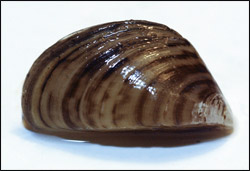 Zebra mussels affect natural eco-systems both directly and indirectly. The greatest direct impact relates to the mussel’s feeding behavior. Zebra mussels are filter feeders and can process up to 1 gallon of water per day/mussel. During this process, every particle in the water column is removed and either eaten by the mussels or wrapped in mucus and spit out. This feeding ability, in combination with high population densities, rapidly clears the water of even the largest lakes.
Zebra mussels affect natural eco-systems both directly and indirectly. The greatest direct impact relates to the mussel’s feeding behavior. Zebra mussels are filter feeders and can process up to 1 gallon of water per day/mussel. During this process, every particle in the water column is removed and either eaten by the mussels or wrapped in mucus and spit out. This feeding ability, in combination with high population densities, rapidly clears the water of even the largest lakes.
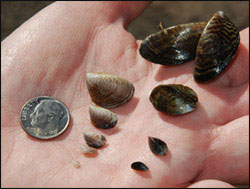 Since zebra mussels became established in Lake Erie, water clarity has increased from 6 inches to 30 feet in some areas. Unfortunately, the material removed from the water consists of other live animals and algae that supply food for larval fish and other invertebrates. In response to this changing food supply, populations of some animals have begun to decline. One drastic impact of the zebra mussel invasion is the near extinction of native clam species throughout the Great Lakes.
Since zebra mussels became established in Lake Erie, water clarity has increased from 6 inches to 30 feet in some areas. Unfortunately, the material removed from the water consists of other live animals and algae that supply food for larval fish and other invertebrates. In response to this changing food supply, populations of some animals have begun to decline. One drastic impact of the zebra mussel invasion is the near extinction of native clam species throughout the Great Lakes.
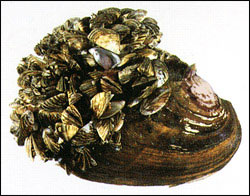 Zebra mussels attach and build colonies on the clams, reducing their ability to move, feed, and breed, eventually leading to the death of the clams. Several species of native fish, birds, and other animals eat young and adult zebra mussels, but even with predation the sheer volume of the invader overwhelms the natural system and in time the entire lake, eco-system, and food web begins to decline in health.
Zebra mussels attach and build colonies on the clams, reducing their ability to move, feed, and breed, eventually leading to the death of the clams. Several species of native fish, birds, and other animals eat young and adult zebra mussels, but even with predation the sheer volume of the invader overwhelms the natural system and in time the entire lake, eco-system, and food web begins to decline in health.
Currently there are no means of eradication for Zebra mussel. The only way to control this 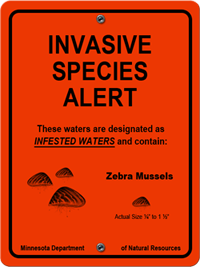 Aquatic Invasive Species (AIS) is through diligent efforts to prevent the spread of Zebra mussel between water bodies. This can be achieved through insuring all gear and equipment is used on infested waters is thoroughly cleaned of all plant and animal materials; live wells, bilge pumps, and boat motors are drained of water upon leaving the infested water body. It is equally important to never reuse bait from infested waters on non-infested waters.
Aquatic Invasive Species (AIS) is through diligent efforts to prevent the spread of Zebra mussel between water bodies. This can be achieved through insuring all gear and equipment is used on infested waters is thoroughly cleaned of all plant and animal materials; live wells, bilge pumps, and boat motors are drained of water upon leaving the infested water body. It is equally important to never reuse bait from infested waters on non-infested waters.
The introduction of leeches, minnows, shiners, earthworms, or other forms of bait to any lands or waters is prohibited. All unwanted or unused fishing bait including minnows, earthworms, and leeches shall be disposed of in the trash and not released into any body of water. Earthworms shall not be released into the wild, lawns or other locations.

Contact us
DRM (218) 335-7400
| Name | Title | Phone |
| Mortensen, Steve | Fish, Wildlife & Plant Resources Program Director | 335-7421 |
| Kapfer, Paul | Wildlife Biologist | 335-7428 |
| Henderson, Bobby | Botanist/Invasive Species Coordinator | 335-7442 |
| Becker, Lisa | Invasive Species Field Technician | 335-7408 |
| Finn, Jon | Fish & Wildlife Field Specialist | 335-7424 |
| White, Gary | Assistant Hatchery Manager | 335-7424 |
| Robinson, Martin | Fish and Wildlife Technician | 335-7424 |
| Cameron, Ben | Service Manager | 335-7425 |















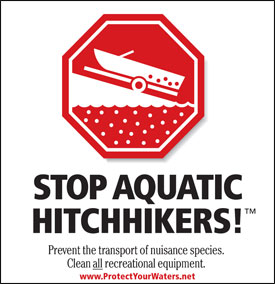
 Division of Resource Management
Division of Resource Management